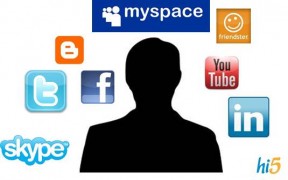 Here’s a scene from a restaurant I’d recently been to.
Here’s a scene from a restaurant I’d recently been to.
Two men entered the restaurant one after the other. Didn’t seem like they had come together but they sat at the same table, facing each other. And soon they started chatting. Exchanging notes. Smiling, laughing. They even got animated and frowned at times. It was all happening at their table until the Manager walked up and said, “Would you like to place your order now, Sir?”
The two men looked up. Away from their phone and iPad, for the first time. And for the first time since they had entered the restaurant, they looked at each other with a quizzical look on their faces. Quickly, they scanned the menu and placed an order. Sooner than not they were back to their conversations and exchange of messages and smiles and frowns and a gamut of emotions that swept through their phones. One of them took a picture of his sizzler while eating and perhaps posted it on his social network page.
They finished their meal. When the bill arrived, one of them handed over his credit card without even looking up. They got up, walked out, without a word or a smile. They left as they had entered, leaving one to wonder whether they were even together.
It all got me thinking. They could’ve been colleagues from office, out for a lazy lunch and some boss-bashing. They could’ve been friends, or worse, school friends who bumped into each other after ages and decided to recall old school days over lunch.
So they did meet over lunch. Or did they?
I had recently watched The Social Network and apart from coming across as a coding prodigy and simply stated, a genius, Mark Zuckerberg (Founder, Facebook) came across to me as a social recluse. A loner who started disconnecting from people and then connecting a million others through interfaces.
He went from faces to interfaces in his mission to make the world more open and connected and has definitely succeeded. But if we look around, what connects us are invisible cables and networks and meshes. Browsers and chat windows. Mobile phones and Value Added Services. The touch, the voice, the connection, the smile, the tear, the elation are not emotions but emoticons that convey your feelings for you.
We are together and not together.
I love the social network. I have got to know amazingly wonderful people who I would’ve perhaps never known otherwise. Got opportunities that would have slipped by for I’d have never even heard about them. Got a platform to showcase my work unlike any other. And perhaps I am echoing the feelings of every person who is on some social network or the other.
The scene from the restaurant was not rare, but it still haunts me.
Do I miss the connection? The real connection? Yes, I certainly do. Mark Zuckerberg has managed to clone himself 600 million times over – there are now more than a whopping 600 million social network subscribers across the globe. And I have no doubt in my mind that the numbers will soon multiply. Like the cell phone subscribers in Korea outnumber their actual population, the number of people signed into a social network will be miles ahead of our census tally.
Do I want to imagine a world without a social network? Do I think we can survive without a social network? We did get by fine before the advent of the telephone, so who knows.
It’s a boon. It’s a bane. Love its socialness. Lament over its anti-socialness. It’s here to stay. Making more connections per every micro second. Growing from one connection to another. From one network to another. From one country to another.
From faces to interfaces.






A very valid point Vaishali … I think social networking is an inevitable outcome of the disconnect that was growing as a result of our ‘progress … fragmentation of large families, of communities … all resulting in a loneliness that has to be assuaged somehow. And Mark Zuckerberg happened. Because humans are essentially social beings and we need other people to in our lives to validate our existence, even if we are not good at direct interactions … and so, as you say, social networks are here to stay, primarily because they address a very basic need of modern existence!
I agree , its changing so fast… my generation thought email was king years ago, then my kids started texting and email was ” so passe” … actually as technology goes vertical I beleive we are onlu in the infancy stage of these ideas … consolidation of all these functions will eventually be via one device and posibbly one interface. But we have to learn to use these things as tools, not as a social opiate.
Parul, basic need of modern existence. Ian, just a tool, not social opiate. Sums it all up!